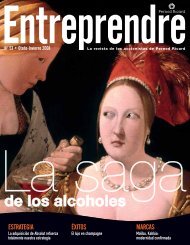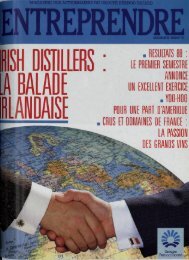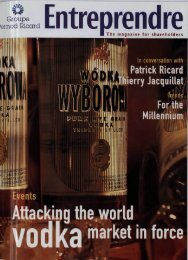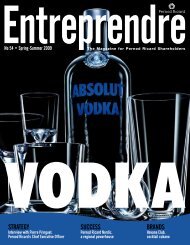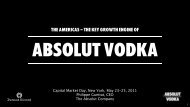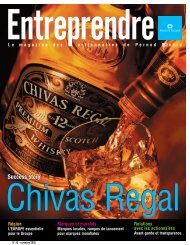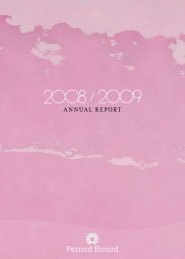Registration Document - Pernod Ricard
Registration Document - Pernod Ricard
Registration Document - Pernod Ricard
Create successful ePaper yourself
Turn your PDF publications into a flip-book with our unique Google optimized e-Paper software.
3 Risk<br />
62<br />
MANAGEMENT REPORT<br />
factors<br />
Presentation of legal risks<br />
Risks relating to intellectual property<br />
The recognition of the Group’s brands is a fundamental part of its<br />
competitiveness. The acquisition of ABSOLUT vodka, the world’s<br />
biggest-selling P remium V odka in volume, made the Group co-leader<br />
in the global S pirits market.<br />
The protection and the defence of its brands and other owned<br />
intellectual property rights require very substantial investments both<br />
for their protection and defence.<br />
The Group has taken very strict actions in this area. It has set out<br />
an intellectual property policy implemented by a team of nearly<br />
25 specialists working in six distinct locations (to whom specific<br />
brand portfolios are allocated), coordinated by the Intellectual<br />
Property Department, which is housed in the holding company. This<br />
team is responsible for the administrative management of the Group’s<br />
brands, designs and models, copyright, domain names and patents<br />
(part of its innovation policy). The team is in charge of coordinating<br />
litigation (counterfeits, unfair competition, forfeiture, opposition,<br />
etc.) and contracts (sale, licensing, coexistence) involving intellectual<br />
property issues and, more broadly, the defence and protection of such<br />
property. Accordingly, when one of the Group’s products is imitated<br />
by a third party, in whatever market, sales forces are called on to work<br />
alongside the team of intellectual property lawyers and to transmit all<br />
information that could help put a stop to illicit acts.<br />
However, the Group is not in a position to guarantee that such measures<br />
are sufficient to force third parties to respect its rights. In some<br />
non-European Union countries, especially in Asia (China, Thailand,<br />
Vietnam, etc.), even though satisfactory legal options generally exist,<br />
it can be difficult to persuade the courts and local authorities to apply<br />
dissuasive sanctions on counterfeiters that reproduce in full or in part<br />
the Group’s most popular brands in these countries. This can lead to<br />
confusion among consumers, with unfavourable consequences on<br />
the image of the relevant products. In such cases, the Group takes<br />
specific action, with objectives determined on the basis of the market<br />
and the brand, bringing together different internal departments so<br />
as to bring a cross-function approach to bear on the problem. Such<br />
actions include coordinated legal responses and operations aimed at<br />
raising awareness among local authorities, field and online surveys,<br />
as well as technical and technological measures aimed at improving<br />
the protection of the Group’s products.<br />
Third parties can also contest the Group’s ownership of certain<br />
brands. For instance, the Group is currently involved in litigation<br />
on the Havana Club brand (see the “Disputes relating to brands”<br />
paragraph in this document).<br />
Legal decisions could therefore affect the Group’s brand portfolio,<br />
potentially having negative effects on its financial position, reported<br />
results and outlook.<br />
Risks relating to change<br />
in the regulatory environment<br />
The Group’s businesses throughout the world are subject to a growing<br />
number of bodies of regulations, in particular with respect to the sale<br />
PERNOD RICARD<br />
and advertising of alcoholic beverages. The regulatory environment<br />
governing the production and marketing of alcoholic beverages could<br />
undergo change in France, in the European Union or in the rest of the<br />
world. Similarly, advertising and promotions of alcoholic beverages<br />
are subject to increasingly stringent rules aimed at changing<br />
consumer behaviour and reducing alcohol consumption.<br />
As a distributor of international beverage brands, the Group is subject<br />
to many regulatory requirements concerning production, product<br />
responsibility, distribution, marketing, advertising, labelling and<br />
imports in the various countries in which it operates. More broadly, it<br />
is also subject to questions relating to competition and consolidation,<br />
marketing and pricing policies, retirement issues, labour law and<br />
environmental issues.<br />
In addition, the Group’s products are subject to import and indirect<br />
taxes in the various countries in which it operates. Regulatory<br />
decisions and changes in legal and regulatory requirements in these<br />
fields could have a negative impact on <strong>Pernod</strong> <strong>Ricard</strong>’s business.<br />
Aside from the fact that change in the laws and regulations applicable<br />
to Group entities in the countries in which they operate would in<br />
some cases be liable to restrict its growth capacity by changing<br />
consumer behaviour, compliance with new laws and regulations<br />
could also require substantial investments. This could potentially<br />
have a significantly negative impact on the Group’s reporting results<br />
and outlook.<br />
Tax increases and changes to other fiscal and<br />
accounting regulations could have a negative<br />
impact on the Group’ financial results<br />
The Wine and Spirits business is very sensitive to fiscal reforms due<br />
to the specific tax regimes applicable to it. It is impossible to gauge<br />
precisely the negative impact on the Group’s sales of potential tax<br />
increases, in whatever country. In addition, the Group’s net profit<br />
is calculated on the basis of extended fiscal and accounting rules in<br />
each country. Changes in tax regulations (including the tax rate) or<br />
accounting rules and standards could have a significant impact on the<br />
Group’s results .<br />
Disputes relating to brands<br />
Havana Club<br />
The Havana Club brand is owned in most countries by a jointventure<br />
company called Havana Club Holding S.A. (HCH), of which<br />
<strong>Pernod</strong> <strong>Ricard</strong> is a shareholder. In some countries, including the United<br />
States, the brand is owned by a Cuban company called Cubaexport.<br />
Ownership of this brand is currently being contested, particularly in<br />
the United States and in Spain by a competitor of <strong>Pernod</strong> <strong>Ricard</strong>.<br />
In 1998, the United States passed a law relating to the conditions for<br />
the protection of brands nationalized by the Castro regime. This law<br />
was condemned by the World Trade Organization (WTO) in 2002 but<br />
to date the United States has not amended its legislation to comply<br />
with the WTO decision.<br />
1. The Office of Foreign Assets Control (OFAC) decided that this law<br />
had the effect of preventing any renewal of the “Havana Club” brand,<br />
which is owned in the United States by Cubaexport. In August 2006,<br />
the United States Patent and Trademark Office (USPTO) denied<br />
I REFERENCE DOCUMENT 2008/2009 I




